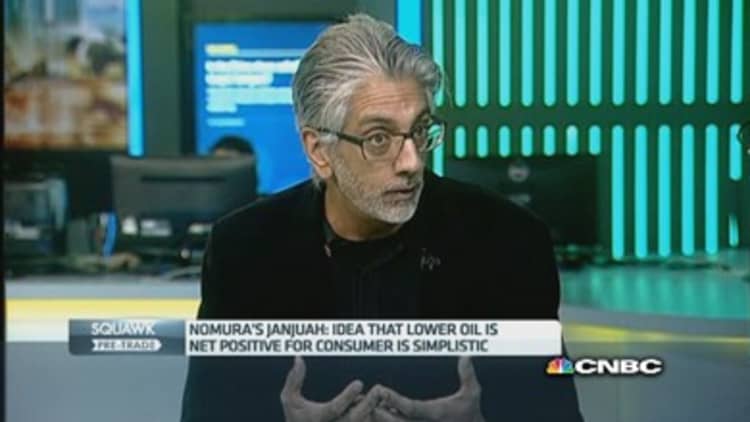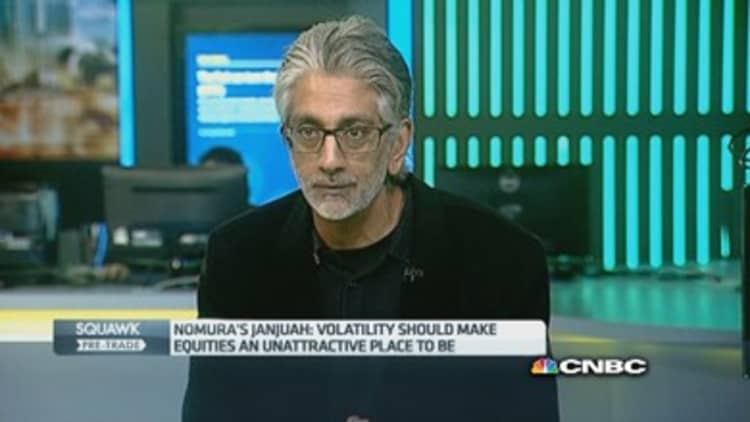
If you thought 2014 was volatile, hold on to your hats this year as the price of oil could hit $30 a barrel and the bond markets will outperform, according to Bob Janjuah, a closely-watched strategist from Nomura Securities.
He told CNBC on Monday that there was little chance of Saudi Arabia changing its decision not to cut oil production, despite the 60 percent fall in prices since June 2014, and the cost of a barrel could head even lower.
"Oil can go up in the short-term but I think actually that there's some political motivations at play here and Saudi Arabia is at risk of losing its position as the marginal price-setter and I don't think they want to lose that position," Janjuah, co-head of cross-asset allocation strategy at Nomura, told CNBC Monday.
"I think the Saudis will potentially carry on (with their policy of not cutting production) and production will remain high but my head target is $30 - $35 as where we could get to. Where prices are now, I think a twenty dollar move is more difficult but I think that's the risk and out there," he told CNBC Europe's "Squawk Box."
On Monday, benchmark Brent crude futures were trading at nearly $49 per barrel and U.S. crude was trading at $47 a barrel. Last week, oil prices dropped to around $45 a barrel – near six-year lows – but prices rebounded Friday after the International Energy Agency said that there were signs "the tide will turn" in the oil market.
The precipitous fall has occurred on the back of an oversupply in the commodity and lack of demand on slowing global growth. Prices have continued to fall after the Organization of Petroleum Exporting Countries (OPEC) decided not to cut output signalling that it was happy to let prices fall so that it could maintain its market share and put pressure on U.S. shale oil producers.
Read MoreSaudi Arabia isplaying chicken with its oil
Janjuah believed that Saudi Arabia – the leading member of OPEC -- would be content to maintain that pressure on the U.S. along with other major oil producers such as Russia. While some economies could benefit from lower oil prices, such as major importer Europe, Janjuah warned about the U.S. whose energy industry has grown thanks to its "fracking" of shale oil.
"If you look at the U.S. economy, the bulk of capital expenditure and jobs growth has been in and around the shale and energy-related sectors so if crude is down around the $30-$35 mark for a significant period of time I think you're going to see a default cycle in the U.S. energy sector."
Bonds to outperform
Aside from concerns over oil, global markets have become convinced that the European Central Bank (ECB) will announce a full-blown sovereign bond-buying program in order to stimulate growth in the deflation-hit euro zone.
All eyes are on the ECB's meeting on Thursday at which it could announce such a scheme, although the finer details of any such program are unknown. Janjuah believed that the bond market would be the best place to be in 2015 thanks to the global disinflation and volatility on equity markets.
Read MoreEuro zone deflation:Why it matters
"I think disinflation is the key theme (this year) so you have to like bonds," Janjuah said. "There is a point in time where disinflation turns into deflation and then you start worrying about that potential car crash where we start to worry about growth and earnings and how that hits the equity trade."

"Equities could go higher but I think they're going to be volatile whereas I think bond markets are a relatively easier place, this year, to make money," he believed.
The uncertain global growth outlook posed by falling prices – and outright deflation in the euro zone, according to the latest data -- has caused a price rally in perceived safe-haven bonds such as U.S. Treasurys. In Europe too, speculation that the ECB is about to launch a full-scale bond-buying offensive have caused the yield on ten-year government debt in countries like Italy and Spain to fall. Yields move inversely to prices in the bond market.
Read MoreEurope court backs ECB bond-buying program
Following the U.S. Federal Reserve's QE program, yields on government debt fell so low that investors turned to equity markets for higher returns, and there are expectations that the same could happen in Europe. While there could be some asset-price inflation in the European equity market, Janjuah insisted that bonds would still outperform on a risk-adjusted basis.
"I think fixed income (is the best place to be) -- which is clearly the unpopular trade out there right now -- because look at where yields are and where can they get to. I would suggest that 30 year bonds in the U.S. will be trading sub-2 percent at some point this year and I think we'll see 10-year Italian and Spanish bonds down at 1 percent," he said.
- By CNBC's Holly Ellyatt, follow her on Twitter @HollyEllyatt. Follow us on Twitter: @CNBCWorld


